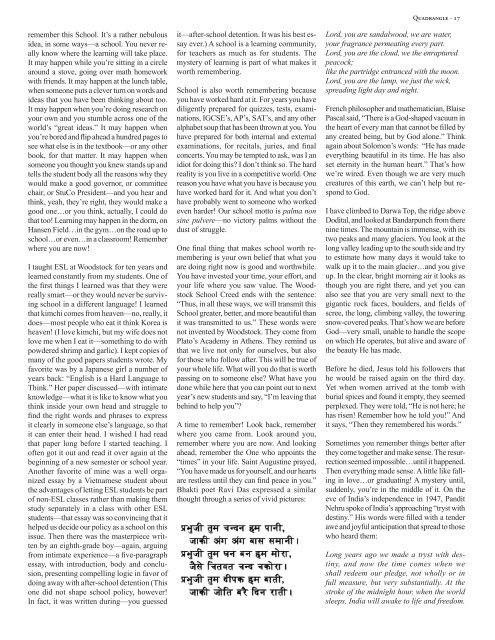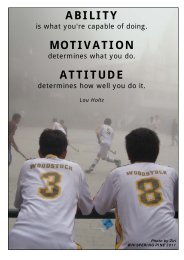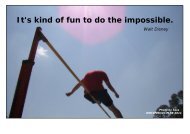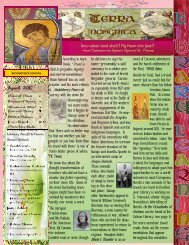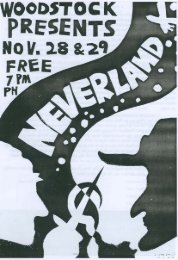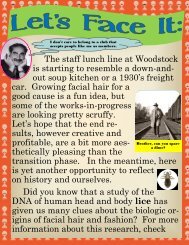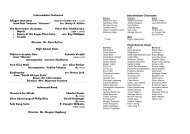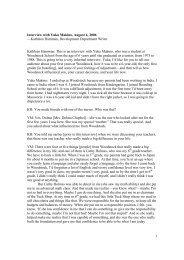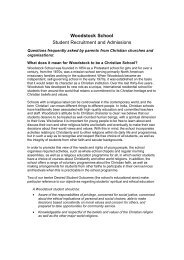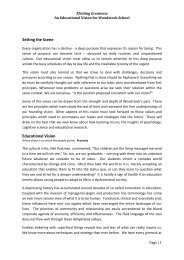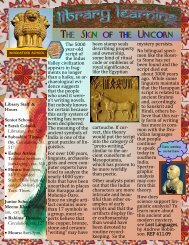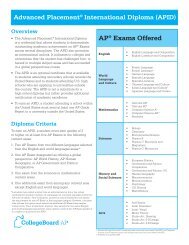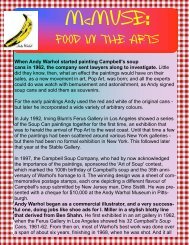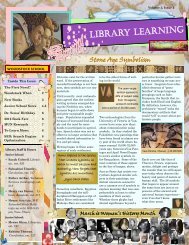Woodstock School Alumni Magazine Vol CIV, 2011
Woodstock School Alumni Magazine Vol CIV, 2011
Woodstock School Alumni Magazine Vol CIV, 2011
Create successful ePaper yourself
Turn your PDF publications into a flip-book with our unique Google optimized e-Paper software.
emember this <strong>School</strong>. It’s a rather nebulous<br />
idea, in some ways—a school. You never really<br />
know where the learning will take place.<br />
It may happen while you’re sitting in a circle<br />
around a stove, going over math homework<br />
with friends. It may happen at the lunch table,<br />
when someone puts a clever turn on words and<br />
ideas that you have been thinking about too.<br />
It may happen when you’re doing research on<br />
your own and you stumble across one of the<br />
world’s “great ideas.” It may happen when<br />
you’re bored and flip ahead a hundred pages to<br />
see what else is in the textbook—or any other<br />
book, for that matter. It may happen when<br />
someone you thought you knew stands up and<br />
tells the student body all the reasons why they<br />
would make a good governor, or committee<br />
chair, or StuCo President—and you hear and<br />
think, yeah, they’re right, they would make a<br />
good one…or you think, actually, I could do<br />
that too! Learning may happen in the dorm, on<br />
Hansen Field…in the gym…on the road up to<br />
school…or even…in a classroom! Remember<br />
where you are now!<br />
I taught ESL at <strong>Woodstock</strong> for ten years and<br />
learned constantly from my students. One of<br />
the first things I learned was that they were<br />
really smart—or they would never be surviving<br />
school in a different language! I learned<br />
that kimchi comes from heaven—no, really, it<br />
does—most people who eat it think Korea is<br />
heaven! (I love kimchi, but my wife does not<br />
love me when I eat it—something to do with<br />
powdered shrimp and garlic). I kept copies of<br />
many of the good papers students wrote. My<br />
favorite was by a Japanese girl a number of<br />
years back: “English is a Hard Language to<br />
Think.” Her paper discussed—with intimate<br />
knowledge—what it is like to know what you<br />
think inside your own head and struggle to<br />
find the right words and phrases to express<br />
it clearly in someone else’s language, so that<br />
it can enter their head. I wished I had read<br />
that paper long before I started teaching. I<br />
often got it out and read it over again at the<br />
beginning of a new semester or school year.<br />
Another favorite of mine was a well organized<br />
essay by a Vietnamese student about<br />
the advantages of letting ESL students be part<br />
of non-ESL classes rather than making them<br />
study separately in a class with other ESL<br />
students—that essay was so convincing that it<br />
helped us decide our policy as a school on this<br />
issue. Then there was the masterpiece written<br />
by an eighth-grade boy—again, arguing<br />
from intimate experience—a five-paragraph<br />
essay, with introduction, body and conclusion,<br />
presenting compelling logic in favor of<br />
doing away with after-school detention (This<br />
one did not shape school policy, however!<br />
In fact, it was written during—you guessed<br />
it—after-school detention. It was his best essay<br />
ever.) A school is a learning community,<br />
for teachers as much as for students. The<br />
mystery of learning is part of what makes it<br />
worth remembering.<br />
<strong>School</strong> is also worth remembering because<br />
you have worked hard at it. For years you have<br />
diligently prepared for quizzes, tests, examinations,<br />
IGCSE’s, AP’s, SAT’s, and any other<br />
alphabet soup that has been thrown at you. You<br />
have prepared for both internal and external<br />
examinations, for recitals, juries, and final<br />
concerts. You may be tempted to ask, was I an<br />
idiot for doing this? I don’t think so. The hard<br />
reality is you live in a competitive world. One<br />
reason you have what you have is because you<br />
have worked hard for it. And what you don’t<br />
have probably went to someone who worked<br />
even harder! Our school motto is palma non<br />
sine pulvere—no victory palms without the<br />
dust of struggle.<br />
One final thing that makes school worth remembering<br />
is your own belief that what you<br />
are doing right now is good and worthwhile.<br />
You have invested your time, your effort, and<br />
your life where you saw value. The <strong>Woodstock</strong><br />
<strong>School</strong> Creed ends with the sentence:<br />
“Thus, in all these ways, we will transmit this<br />
<strong>School</strong> greater, better, and more beautiful than<br />
it was transmitted to us.” These words were<br />
not invented by <strong>Woodstock</strong>. They come from<br />
Plato’s Academy in Athens. They remind us<br />
that we live not only for ourselves, but also<br />
for those who follow after. This will be true of<br />
your whole life. What will you do that is worth<br />
passing on to someone else? What have you<br />
done while here that you can point out to next<br />
year’s new students and say, “I’m leaving that<br />
behind to help you”?<br />
A time to remember! Look back, remember<br />
where you came from. Look around you,<br />
remember where you are now. And looking<br />
ahead, remember the One who appoints the<br />
“times” in your life. Saint Augustine prayed,<br />
“You have made us for yourself, and our hearts<br />
are restless until they can find peace in you.”<br />
Bhakti poet Ravi Das expressed a similar<br />
thought through a series of vivid pictures:<br />
Quadrangle - 17<br />
Lord, you are sandalwood, we are water,<br />
your fragrance permeating every part.<br />
Lord, you are the cloud, we the enraptured<br />
peacock;<br />
like the partridge entranced with the moon.<br />
Lord, you are the lamp, we just the wick,<br />
spreading light day and night.<br />
French philosopher and mathematician, Blaise<br />
Pascal said, “There is a God-shaped vacuum in<br />
the heart of every man that cannot be filled by<br />
any created being, but by God alone.” Think<br />
again about Solomon’s words: “He has made<br />
everything beautiful in its time. He has also<br />
set eternity in the human heart.” That’s how<br />
we’re wired. Even though we are very much<br />
creatures of this earth, we can’t help but respond<br />
to God.<br />
I have climbed to Darwa Top, the ridge above<br />
Dodital, and looked at Bandarpunch from there<br />
nine times. The mountain is immense, with its<br />
two peaks and many glaciers. You look at the<br />
long valley leading up to the south side and try<br />
to estimate how many days it would take to<br />
walk up it to the main glacier…and you give<br />
up. In the clear, bright morning air it looks as<br />
though you are right there, and yet you can<br />
also see that you are very small next to the<br />
gigantic rock faces, boulders, and fields of<br />
scree, the long, climbing valley, the towering<br />
snow-covered peaks. That’s how we are before<br />
God—very small, unable to handle the scope<br />
on which He operates, but alive and aware of<br />
the beauty He has made.<br />
Before he died, Jesus told his followers that<br />
he would be raised again on the third day.<br />
Yet when women arrived at the tomb with<br />
burial spices and found it empty, they seemed<br />
perplexed. They were told, “He is not here; he<br />
has risen! Remember how he told you!” And<br />
it says, “Then they remembered his words.”<br />
Sometimes you remember things better after<br />
they come together and make sense. The resurrection<br />
seemed impossible…until it happened.<br />
Then everything made sense. A little like falling<br />
in love…or graduating! A mystery until,<br />
suddenly, you’re in the middle of it. On the<br />
eve of India’s independence in 1947, Pandit<br />
Nehru spoke of India’s approaching “tryst with<br />
destiny.” His words were filled with a tender<br />
awe and joyful anticipation that spread to those<br />
who heard them:<br />
Long years ago we made a tryst with destiny,<br />
and now the time comes when we<br />
shall redeem our pledge, not wholly or in<br />
full measure, but very substantially. At the<br />
stroke of the midnight hour, when the world<br />
sleeps, India will awake to life and freedom.


